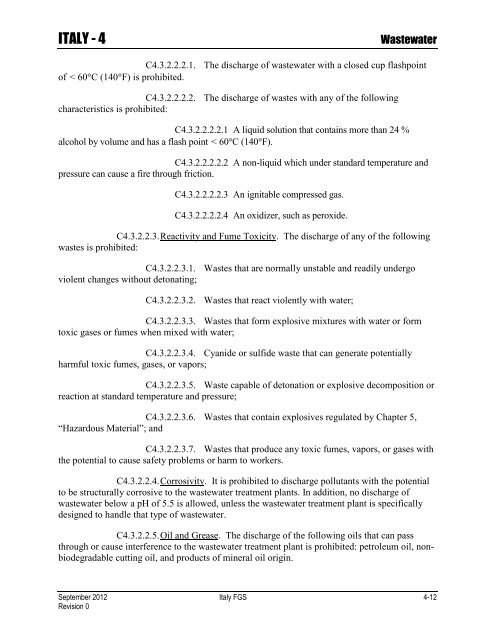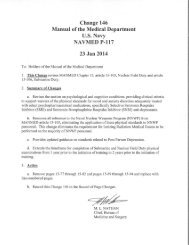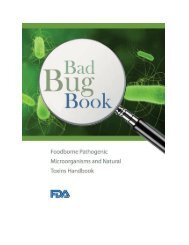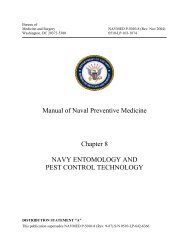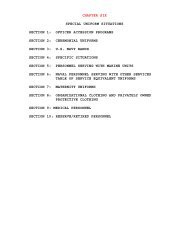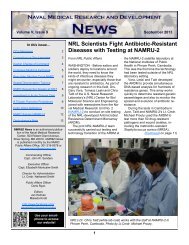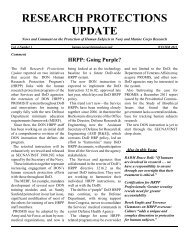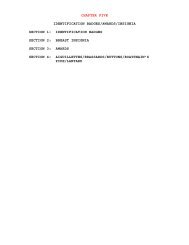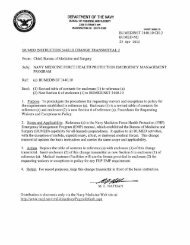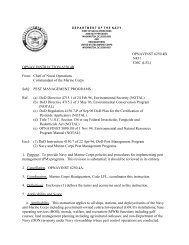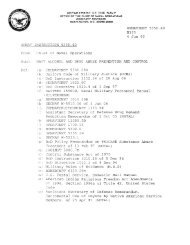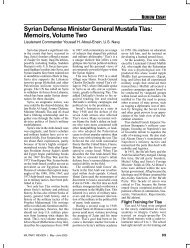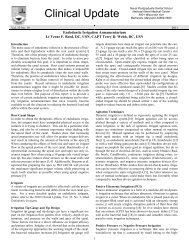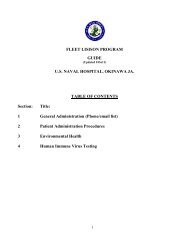- Page 1:
ENVIRONMENTAL FINAL GOVERNING STAND
- Page 4 and 5:
ITALY Table of Contents Chapters Pa
- Page 6 and 7:
ITALY - 1 Overview C1.3.3. Operatio
- Page 8 and 9:
ITALY - 1 Overview C1.7. PERMITS AN
- Page 10 and 11:
This page intentionally left blank.
- Page 12 and 13:
ITALY - 2 Air Emissions C2.2.3.5.3.
- Page 14 and 15:
ITALY - 2 Air Emissions C2.2.22. Re
- Page 16 and 17:
ITALY - 2 Air Emissions waste or mu
- Page 18 and 19:
ITALY - 2 Air Emissions C2.3.5.1. A
- Page 20 and 21:
ITALY - 2 Air Emissions C2.3.6.8.2.
- Page 22 and 23:
ITALY - 2 Air Emissions Table 2.1.
- Page 24 and 25:
ITALY - 2 Air Emissions Table 2.3-a
- Page 26 and 27:
ITALY - 2 Air Emissions Characteris
- Page 28 and 29:
ITALY - 2 Air Emissions Category of
- Page 30 and 31:
ITALY - 2 Air Emissions Category of
- Page 32 and 33:
This page intentionally left blank.
- Page 34 and 35:
ITALY - 3 Drinking Water drinking w
- Page 36 and 37:
ITALY - 3 Drinking Water C3.3. CRIT
- Page 38 and 39:
ITALY - 3 Drinking Water C3.3.1.7.1
- Page 40 and 41:
ITALY - 3 Drinking Water be require
- Page 42 and 43:
ITALY - 3 Drinking Water lead servi
- Page 44 and 45:
ITALY - 3 Drinking Water to meet DD
- Page 46 and 47:
ITALY - 3 Drinking Water d. For unf
- Page 48 and 49:
ITALY - 3 Drinking Water Population
- Page 50 and 51:
ITALY - 3 Drinking Water Table 3.3.
- Page 52 and 53: ITALY - 3 Drinking Water Table 3.4-
- Page 54 and 55: ITALY - 3 Drinking Water Contaminan
- Page 56 and 57: ITALY - 3 Drinking Water Table 3.5-
- Page 58 and 59: ITALY - 3 Drinking Water Parameter
- Page 60 and 61: ITALY - 3 Drinking Water Parameter
- Page 62 and 63: ITALY - 3 Drinking Water Table 3.7.
- Page 64 and 65: ITALY - 3 Drinking Water system and
- Page 66 and 67: ITALY - 3 Drinking Water Table 3.9.
- Page 68 and 69: ITALY - 3 Drinking Water Table 3.11
- Page 70 and 71: ITALY - 3 Drinking Water Table 3.13
- Page 72 and 73: ITALY - 3 Drinking Water Table 3.15
- Page 74 and 75: ITALY - 3 Drinking Water Table 3.17
- Page 76 and 77: ITALY - 3 Drinking Water Table 3.25
- Page 78 and 79: ITALY - 3 Drinking Water Notes: 1.
- Page 80 and 81: ITALY - 3 Drinking Water Parameter
- Page 82 and 83: ITALY - 3 Drinking Water Parameter
- Page 84 and 85: ITALY - 3 Drinking Water Parameter
- Page 86 and 87: ITALY - 3 Drinking Water Parameter
- Page 88 and 89: ITALY - 3 Drinking Water Table 3.29
- Page 90 and 91: ITALY - 3 Drinking Water Book of AS
- Page 92 and 93: ITALY - 4 Wastewater C4.2.9. Chemic
- Page 94 and 95: ITALY - 4 Wastewater C4.2.31.2. Fre
- Page 96 and 97: ITALY - 4 Wastewater Table 4.1.1-b:
- Page 98 and 99: ITALY - 4 Wastewater C4.3.1.6.3. Ur
- Page 100 and 101: ITALY - 4 Wastewater C4.3.1.9.1. An
- Page 104 and 105: ITALY - 4 Wastewater C4.3.3.1. Elec
- Page 106 and 107: ITALY - 4 Wastewater C4.3.3.2. Moni
- Page 108 and 109: ITALY - 4 Wastewater C4.3.4.3.3. Fi
- Page 110 and 111: ITALY - 4 Wastewater Parameter Unit
- Page 112 and 113: ITALY - 4 Wastewater Parameter Unit
- Page 114 and 115: ITALY - 4 Wastewater For artificial
- Page 116 and 117: ITALY - 4 Wastewater Parameter # Pa
- Page 118 and 119: ITALY - 4 Wastewater Parameter # Pa
- Page 120 and 121: ITALY - 4 Wastewater Table 4.1.1-a.
- Page 122 and 123: ITALY - 4 Wastewater Table 4.1.2-b.
- Page 124 and 125: ITALY - 4 Wastewater Table 4.4. Com
- Page 126 and 127: ITALY - 4 Wastewater Table 4.7. Bes
- Page 128 and 129: ITALY - 4 Wastewater 1.4 Chemical i
- Page 130 and 131: ITALY - 4 Wastewater 3 Installation
- Page 132 and 133: ITALY - 4 Wastewater D1 Tipping abo
- Page 134 and 135: ITALY - 4 Wastewater Table 4.10. Ap
- Page 136 and 137: ITALY - 4 Wastewater (3) The above
- Page 138 and 139: ITALY - 5 Hazardous Materials C5.2.
- Page 140 and 141: ITALY - 5 Hazardous Materials C5.3.
- Page 142 and 143: ITALY - 5 Hazardous Materials C5.3.
- Page 144 and 145: ITALY - 5 Hazardous Materials adver
- Page 146 and 147: ITALY - 6 Hazardous Waste C6.2. DEF
- Page 148 and 149: ITALY - 6 Hazardous Waste quart) of
- Page 150 and 151: ITALY - 6 Hazardous Waste C6.2.30.6
- Page 152 and 153:
ITALY - 6 Hazardous Waste C6.2.37.2
- Page 154 and 155:
ITALY - 6 Hazardous Waste complete
- Page 156 and 157:
ITALY - 6 Hazardous Waste C6.3.5.11
- Page 158 and 159:
ITALY - 6 Hazardous Waste C6.3.8.1.
- Page 160 and 161:
ITALY - 6 Hazardous Waste C6.3.8.2.
- Page 162 and 163:
ITALY - 6 Hazardous Waste C6.3.8.5.
- Page 164 and 165:
ITALY - 6 Hazardous Waste access by
- Page 166 and 167:
ITALY - 6 Hazardous Waste C6.3.8.8.
- Page 168 and 169:
ITALY - 6 Hazardous Waste C6.3.8.10
- Page 170 and 171:
ITALY - 6 Hazardous Waste can also
- Page 172 and 173:
This page intentionally left blank.
- Page 174 and 175:
ITALY - 7 Solid Waste USEUCOM Waste
- Page 176 and 177:
ITALY - 7 Solid Waste hazardous was
- Page 178 and 179:
ITALY - 7 Solid Waste C7.2.31.10. M
- Page 180 and 181:
ITALY - 7 Solid Waste C7.2.37.5. Ya
- Page 182 and 183:
ITALY - 7 Solid Waste C7.3.3.1.8. N
- Page 184 and 185:
ITALY - 7 Solid Waste C7.3.6.3.1. D
- Page 186 and 187:
ITALY - 7 Solid Waste must be at le
- Page 188 and 189:
ITALY - 7 Solid Waste “Hazardous
- Page 190 and 191:
ITALY - 7 Solid Waste Table 7.3. Ma
- Page 192 and 193:
ITALY - 8 Medical Waste Management
- Page 194 and 195:
ITALY - 8 Medical Waste Management
- Page 196 and 197:
ITALY - 8 Medical Waste Management
- Page 198 and 199:
ITALY - 8 Medical Waste Management
- Page 200 and 201:
ITALY - 8 Medical Waste Management
- Page 202 and 203:
ITALY - 8 Medical Waste Management
- Page 204 and 205:
ITALY - 8 Medical Waste Management
- Page 206 and 207:
ITALY - 9 Petroleum, Oil, and Lubri
- Page 208 and 209:
ITALY - 9 Petroleum, Oil, and Lubri
- Page 210 and 211:
This page intentionally left blank.
- Page 212 and 213:
ITALY - 11 Pesticides C11.2.7. Pest
- Page 214 and 215:
ITALY - 11 Pesticides pesticides, t
- Page 216 and 217:
ITALY - 12 Historic & Cultural Reso
- Page 218 and 219:
ITALY - 12 Historic & Cultural Reso
- Page 220 and 221:
ITALY - 12 Historic & Cultural Reso
- Page 222 and 223:
ITALY - 13 Natural Resources and En
- Page 224 and 225:
ITALY - 13 Natural Resources and En
- Page 226 and 227:
This page intentionally left blank.
- Page 228 and 229:
ITALY - 14 Polychlorinated Biphenyl
- Page 230 and 231:
ITALY - 14 Polychlorinated Biphenyl
- Page 232 and 233:
ITALY - 14 Polychlorinated Biphenyl
- Page 234 and 235:
This page intentionally left blank.
- Page 236 and 237:
ITALY - 15 ASBESTOS C15.3. CRITERIA
- Page 238 and 239:
ITALY - 15 ASBESTOS C15.3.4.4. The
- Page 240 and 241:
This page intentionally left blank.
- Page 242 and 243:
ITALY - 17 Lead-Based Paint C17.2.7
- Page 244 and 245:
ITALY - 17 Lead-Based Paint C17.3.1
- Page 246 and 247:
This page intentionally left blank.
- Page 248 and 249:
ITALY - 18 Spill Prevention and Res
- Page 250 and 251:
ITALY - 18 Spill Prevention and Res
- Page 252 and 253:
ITALY - 18 Spill Prevention and Res
- Page 254 and 255:
ITALY - 18 Spill Prevention and Res
- Page 256 and 257:
This page intentionally left blank.
- Page 258 and 259:
ITALY - 19 Underground Storage Tank
- Page 260 and 261:
ITALY - 19 Underground Storage Tank
- Page 262 and 263:
This page intentionally left blank.
- Page 264 and 265:
ITALY - APPENDIX A List of Hazardou
- Page 266 and 267:
ITALY - APPENDIX A List of Hazardou
- Page 268 and 269:
ITALY - APPENDIX A List of Hazardou
- Page 270 and 271:
ITALY - APPENDIX A List of Hazardou
- Page 272 and 273:
ITALY - APPENDIX A List of Hazardou
- Page 274 and 275:
ITALY - APPENDIX A List of Hazardou
- Page 276 and 277:
ITALY - APPENDIX A List of Hazardou
- Page 278 and 279:
ITALY - APPENDIX A List of Hazardou
- Page 280 and 281:
ITALY - APPENDIX A List of Hazardou
- Page 282 and 283:
ITALY - APPENDIX A List of Hazardou
- Page 284 and 285:
ITALY - APPENDIX A List of Hazardou
- Page 286 and 287:
ITALY - APPENDIX A List of Hazardou
- Page 288 and 289:
ITALY - APPENDIX A List of Hazardou
- Page 290 and 291:
ITALY - APPENDIX A List of Hazardou
- Page 292 and 293:
ITALY - APPENDIX A List of Hazardou
- Page 294 and 295:
ITALY - APPENDIX A List of Hazardou
- Page 296 and 297:
ITALY - APPENDIX B.1 Characteristic
- Page 298 and 299:
This page intentionally left blank.
- Page 300 and 301:
This page intentionally left blank.
- Page 302 and 303:
ITALY - APPENDIX B.4 Non-Hazardous
- Page 304 and 305:
ITALY - APPENDIX B.4 Non-Hazardous
- Page 306 and 307:
ITALY - APPENDIX B.4 Non-Hazardous
- Page 308 and 309:
ITALY - APPENDIX B.4 Non-Hazardous
- Page 310 and 311:
This page intentionally left blank.
- Page 312 and 313:
ITALY - APPENDIX B.5 Hazardous Wast
- Page 314 and 315:
ITALY - APPENDIX B.6 Persistent Org
- Page 316:
ITALY - APPENDIX C Determination of


